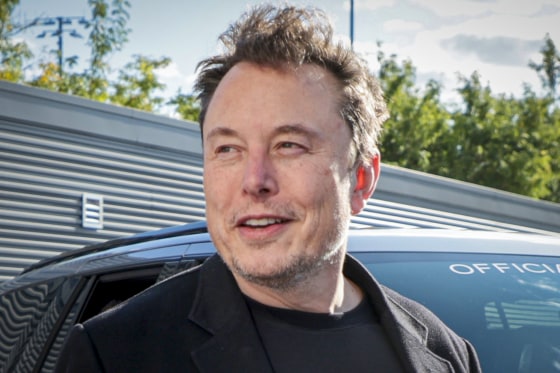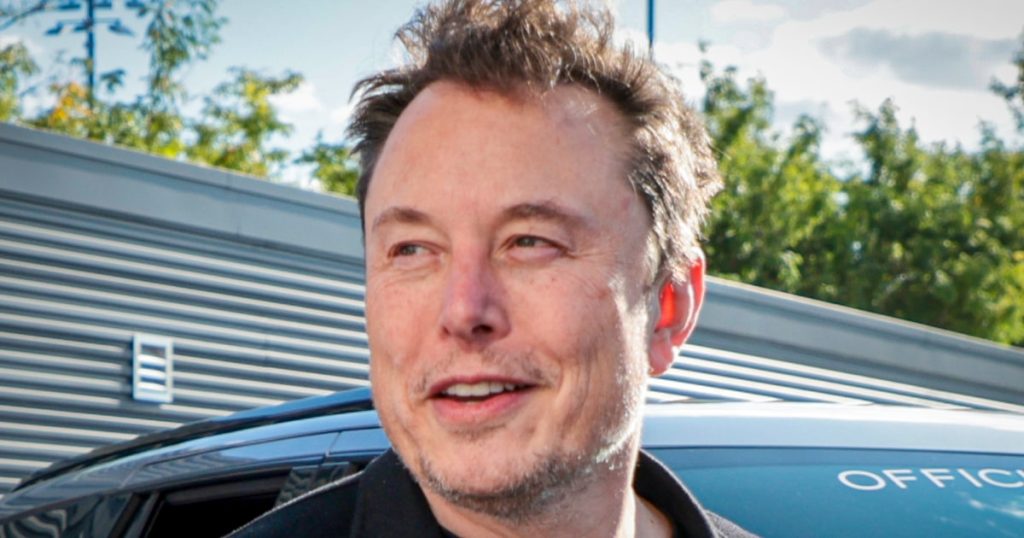How Elon Musk amplified content from a suspected Russian election interference plot

As Elon Musk increasingly weighed in on politics in the last several years, he used his massive following on his social media app X to repeatedly amplify content from a company that appears to be at the center of an alleged Russian covert operation to manipulate U.S. public opinion ahead of the 2024 election.
Musk, one of the world’s richest people, boosted content from creators and accounts tied to Tenet Media at least 60 times, resharing the operation’s posts and engaging in back-and-forth replies with Tenet’s paid pundits on X.
Musk’s posts, shared with his 198 million followers, put Russia-aligned conservative talking points in front of possibly tens of millions of eyeballs, according to the viewership data published by X, and he did so apparently without knowledge of the alleged Russian money behind the operation.
An earlier NBC News review of Tenet’s videos combined with details from government indictments illustrated how the company amplified conservatives who had already embraced many talking points favored by former President Donald Trump and Russia, in line with the country’s broader propaganda goals.
In July, Musk reshared a post from a Tenet Media account defending comments by Trump, the Republican presidential nominee, that “you won’t have to vote anymore” if Trump returns to the White House, and Musk’s reshare received 28 million views, according to X.
Tenet Media appeared to seek out Musk’s attention, posting about Musk or tagging his account more than 50 times since the media company’s launch last November, often on the subject of Trump and the presidential election.
Tenet launched last year as a kind of supergroup for conservative pundits seemingly out of nowhere, bringing together established podcasters such as Dave Rubin and Benny Johnson with younger and less experienced influencers.
Tenet has ceased releasing new material since federal prosecutors unsealed an indictment on Sept. 4 charging two employees of Russia-backed media network RT of directing a $10 million scheme to launder pro-Russian views through conservative American commentators. FBI Director Christopher Wray said the operation was an attempt to “trick Americans into unwittingly consuming foreign propaganda.”
Tenet and its stable of pundits were not specifically named in the indictment, but Tenet’s makeup matches the indictment’s description of a media company that called itself a “network of heterodox commentators that focus on Western political and cultural issues.” Since the indictment was unsealed, numerous high-profile Tenet creators have spoken out calling themselves “victims.”
If the allegations in the indictment prove true (or similar), Musk would serve as a high-profile example of how Russia-associated actors were able to bait a target into engaging with their content and sharing it.
Musk can bring enormous attention to an account with his posts because he has the largest following on X. And even a reply from him can boost another account, because replies sometimes show up in people’s feeds.
Musk also shared Russia-aligned talking points outside the context of the conspiracy alleged in the recent indictment, according to a report Tuesday by Radio Free Europe/Radio Liberty. Citing records from a Russian disinformation campaign, the news service said that an internet meme denigrating Ukrainian President Volodymyr Zelenskyy and shared on X last year by Musk was made by a Moscow-based company called Social Design Agency.
Musk did not respond to an email Tuesday asking about the Radio Free Europe/Radio Liberty report and about his sharing of Tenet Media content. Representatives for X also did not respond to a request for comment about Musk or about X’s handling of Tenet content.
In posts on X, Musk has appeared unconcerned about Russia’s influence operations. The day the Tenet Media indictment was announced, Musk reacted with the “tears of joy” emoji to another user’s unproven theory that the covert project may have backfired by causing infighting among conservatives.
The day after the indictment dropped, Musk accused The Associated Press of pushing anti-Trump “propaganda” in its coverage of Tenet Media. And he posted in defense of the right-wing podcasters Tenet had retained, agreeing with another conservative commentator, Ben Shapiro, that the men were deceived.
Other commentators have accused the people paid by Tenet of being too easily deceived and of failing to ask enough questions of the people paying them.
Josephine Lukito, who studies Russian disinformation as an assistant professor at the University of Texas at Austin’s journalism school, said Musk’s amplification of Tenet content fit a pattern for the tech billionaire.
“As the owner of a social media platform, Musk certainly should be vetting content he shares more. But it doesn’t surprise me that he is not apologetic about this, as Musk has, in the past, shared misleading or inaccurate information without, seemingly, any concern,” Lukito said in an email. (Musk has shared misleading claims about anti-Muslim riots in the U.K. and inaccurate information about voting, for example.)
“At this point, we should expect this as a norm for Musk, and not an outlier of his activity,” she said.
Musk has frequently replied to or reposted content from three conservative pundits formerly paid by Tenet: Tim Pool, Dave Rubin and Benny Johnson. From the public launch of Tenet Media in November 2023 until the release of the indictment, Musk interacted with Pool’s account at least 32 times, Rubin’s at least 11 times and Johnson’s at least nine times, according to searches of X’s archives. He did so on a wide array of subjects including immigration, presidential politics and homelessness.
Tech platforms are split on what to do with Tenet’s back catalog of videos. YouTube and Meta removed Tenet’s accounts, citing their policies against disinformation, while X and right-wing video platform Rumble have left up Tenet’s content.
The Senate Intelligence Committee is scheduled to tackle the subject of foreign threats to elections in a hearing Wednesday afternoon. Among the scheduled witnesses are executives from Google’s parent company, Alphabet; Facebook’s parent company, Meta; and Microsoft. A representative for X was not at the hearing because the company “declined to send an appropriate witness,” a representative for the committee chair, Mark Warner, D-Va., said in an emailed statement to CNBC. The hearing was set for 2:30 p.m. ET.
Given Musk’s stature, his amplification of Tenet Media’s content appears to have been unique. NBC News searched for other high-profile individuals who shared Tenet Media content and did not find other CEOs of large tech companies or celebrities who had done so to the same degree.
Musk thrives in the conservative media ecology and has helped to build it, including by allowing previously suspended accounts back onto X since he bought the app two years ago, said Martin Riedl, an assistant professor in the School of Journalism and Media at the University of Tennessee, Knoxville.
“Musk’s stature in the online ecology of the far right is unique,” he said in an email.
In August, Musk replied “!!” to a Tenet post on X criticizing diversity training at NASA. That post by Tenet received 1.9 million views, far more than Tenet’s typical posts, although it’s impossible to determine how much Musk helped. In April, Musk replied with the monocle emoji to a Tenet video about “eco-terrorism.”
Musk has used his influence to spotlight some of Tenet’s individual creators, too. In mid-August, Musk had a back-and-forth with then-Tenet Media pundit Lauren Southern, which began with her saying most people misunderstand Musk and Trump.
“Anyone who thinks the media is real is an idiot,” Musk responded, getting more than 647,000 views.
“Much work to do in reversing this brain rot,” Southern wrote back.
“Much work indeed. And it’s far worse in Europe. People really believe the media there!” Musk replied.
Southern and other commentators formerly employed by Tenet Media have said that they did nothing wrong. The indictment says they were unaware they were being paid by Russian sources and that they had been deceived about the sources.
Source: https://www.nbcnews.com







More Stories
India Plane Crash: What Investigators Might Examine
Washington Post Cancels Ad From Groups Calling for Trump to Fire Musk
As Trump Attacks D.E.I., Some on the Left Approve